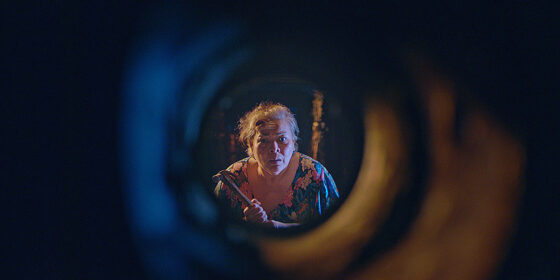TIFF 2022 | Leonor Will Never Die (Martika Ramirez Escobar, Philippines) — Midnight Madness

By Michael Sicinski
Narrative reflexivity. Some scholars argue that it began with Sterne’s Tristram Shandy, while others go back as far as Plato’s dialogues. In cinema, it’s been around pretty much from the beginning, with Edwin Porter’s 1902 short comedy Uncle Josh at the Moving Picture Show, and Buster Keaton perfecting the form a few decades later with Sherlock, Jr. (1924). Since then, reflexivity—“hey, we’re inside a movie!”—has been a go-to for artists hoping to add a bit of edge to otherwise pedestrian ideas. There’s a fairly wide philosophical gap between, say, Synecdoche, New York (2008) and Teen Beach Movie (2013).
Leonor Will Never Die, from Filipino director Martika Ramirez Escobar, is a very 2022 film in the sense that it places the viewer inside a hall of mirrored irony. Macho gunplay and chopsocky moves now require the insulating safety of scarequotes. To accomplish this, Escobar establishes a real world that intersects directly with the film industry. Elderly protagonist Leonor (Sheila Francisco, in her debut role) was herself a director of fast-and-cheap action movies in the 1980s. Her career, it seems, was curtailed by the untimely death of her son / leading man Ronwaldo (Anthony Falcon) in an on-set accident. In one of the film’s oddest touches, Ronwaldo consistently interacts with his family as a ghost, suggesting that Leonor cannot let him go. In this regard, Escobar uses him as an emblem of a moment in cinema history that exerts a hold over Leonor and her generation.
Following a highly symbolic accident—getting hit on the head by a falling television—Leonor finds herself suspended between life and death, having been transported into the universe of one of her own films. At first, Leonor is excited by the apparent omnipotence she exerts in this world. (Cf. Emma Thompson’s novelist in Stranger Than Fiction [2006].) But she soon discovers she may be a prisoner of her own commitment to B-movie mayhem, and be forced to watch Ronwaldo die all over again. All the makings for a clever action-comedy seem to be there, but Leonor never finds its tone. Escobar struggles to combine a goofy tribute to Filipino cine-cheese with a heartfelt tale of generational reckoning. The final ten minutes, filled with more overt frame-busting—rehearsal footage, shots of the editing deck, and a final burst into song—ought to feel liberating, but instead come off like the end of a fireworks display, with Escobar and company just firing off every last idea in the playbook.
Michael Sicinski- « Previous
- 1
- 2


